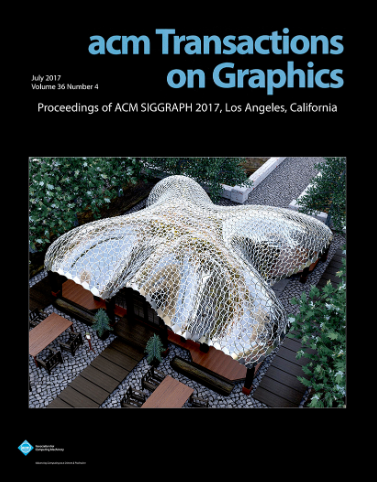JGS2: Near Second-order Converging Jacobi/Gauss-Seidel for GPU Elastodynamics
IF 9.5
1区 计算机科学
Q1 COMPUTER SCIENCE, SOFTWARE ENGINEERING
引用次数: 0
Abstract
In parallel simulation, convergence and parallelism are often seen as inherently conflicting objectives. Improved parallelism typically entails lighter local computation and weaker coupling, which unavoidably slow the global convergence. This paper presents a novel GPU algorithm that achieves convergence rates comparable to fullspace Newton's method while maintaining good parallelizability just like the Jacobi method. Our approach is built on a key insight into the phenomenon ofGPU弹性动力学的近二阶收敛Jacobi/Gauss-Seidel
在并行仿真中,收敛性和并行性通常被视为内在冲突的目标。改进的并行性通常需要更少的局部计算和更弱的耦合,这不可避免地会减慢全局收敛速度。本文提出了一种新的GPU算法,该算法既能达到与全空间牛顿方法相当的收敛速度,又能像雅可比方法一样保持良好的并行性。我们的方法是建立在对超调现象的关键洞察之上的。当局部求解器在不考虑全局环境的情况下积极地最小化其局部能量时,就会出现超调,导致局部更新破坏了全局收敛。为了解决这个问题,我们推导了一个理论上的二阶最优解来减轻超调。此外,我们将此解改编为可预计算的形式。利用Cubature采样,我们的运行时成本仅略高于Jacobi方法,但我们的算法收敛速度几乎是牛顿方法的二次。为了更有效地进行预计算,我们还引入了一种新的全坐标公式。该方法与增量势接触法无缝集成,对刚性和软质材料均能实现二阶收敛。实验结果表明,我们的方法提供了高质量的模拟,并且比最先进的GPU方法具有50到100倍的收敛性。
本文章由计算机程序翻译,如有差异,请以英文原文为准。
求助全文
约1分钟内获得全文
求助全文
来源期刊

ACM Transactions on Graphics
工程技术-计算机:软件工程
CiteScore
14.30
自引率
25.80%
发文量
193
审稿时长
12 months
期刊介绍:
ACM Transactions on Graphics (TOG) is a peer-reviewed scientific journal that aims to disseminate the latest findings of note in the field of computer graphics. It has been published since 1982 by the Association for Computing Machinery. Starting in 2003, all papers accepted for presentation at the annual SIGGRAPH conference are printed in a special summer issue of the journal.
 求助内容:
求助内容: 应助结果提醒方式:
应助结果提醒方式:


